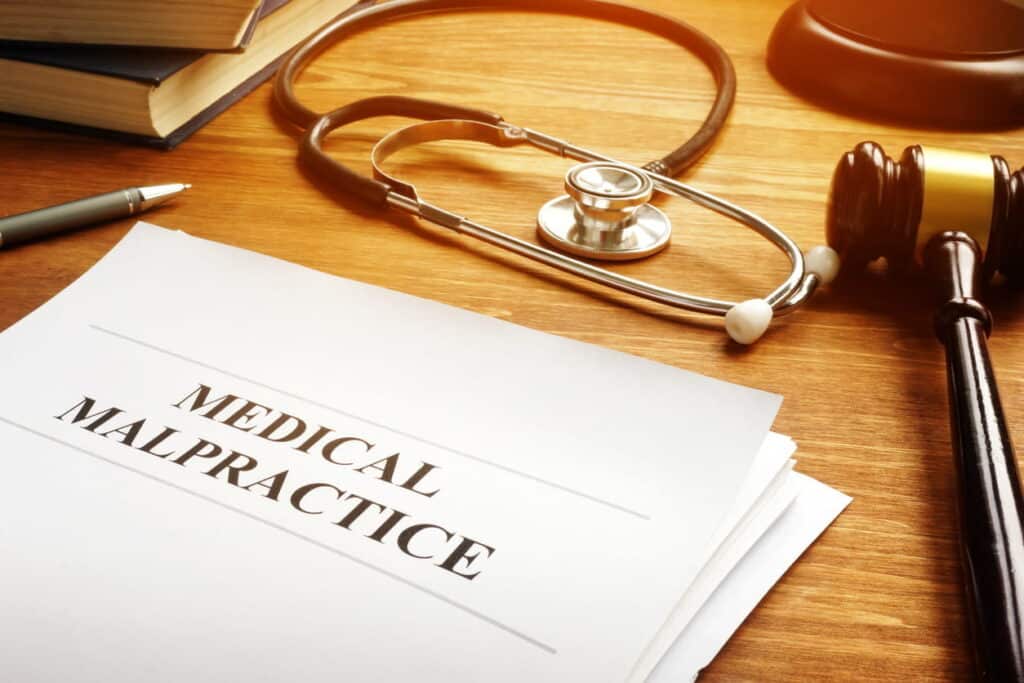
START YOUR FREE CONSULTATION
NO FEES UNLESS WE WIN!
Medical malpractice lawsuits can be an incredibly stressful experience for each party involved. Having an experienced medical malpractice lawyer guide you through this difficult process can allow you to focus on healing from your injuries. If you’re the victim of a hospital injury, poor medical service, or otherwise have a poor outcome from seeking medical care, you likely have a medical malpractice lawsuit.
Call (702) 382-0000 for a free consultation
What is medical malpractice?
Medical malpractice is a type of personal injury claim based on negligence. Medical malpractice is unique in that it is based on professional standards for trained medical service providers. Further, medical malpractice depends on what the medical professionals should know and do in any given situation within their medical practice.
Put more simply, medical malpractice happens if the action or lack of action injures a patient on behalf of physicians or other medical professionals. The following incidents often result in a medical malpractice lawsuit:
- Surgery errors
- Medical misdiagnosis or delayed diagnoses
- Hospital related infections
- Childbirth injuries
- Retained foreign objects
- Failure to treat
- Anesthesia errors
- Prescription drug errors
Many different injuries can stem from these medical malpractice incidents, ranging from permanent disability to death.
Although these may be some of the most common medical malpractice claims and injuries, medical malpractice claims can vary significantly. If you’ve been injured or harmed due to a medical professional’s negligence and you’re unsure whether you have a medical malpractice lawsuit, it’s important to contact a medical malpractice attorney right away to ensure you file the claim within the appropriate statute of limitations.
Medical malpractice vs. medical negligence
Many legal terms are used when filing lawsuits, and pursuing the correct case type can make the difference between success and failure. Those who aren’t legal experts may find determining which terms apply to their case confusing and need these terms clarified.
Although medical malpractice and medical negligence sound similar, some crucial distinctions exist between these terms. In legal terms, negligence refers to a person’s failure to act like most reasonable people would in the same circumstances. People are expected to adhere to acceptable standards of behavior to ensure the safety of themselves and others and prevent property damage. When a person doesn’t behave this way and another person is harmed, the victim can pursue a personal injury case against the at-fault party.
Negligence also exists in the medical field. It’s reasonable for patients to expect medical professionals to deliver an acceptable standard of care. A medical professional who fails to meet medical standards of care is guilty of negligence.
When the medical professional is negligent, and their negligence causes a patient harm, the medical professional can be sued for medical malpractice. To win the lawsuit, a patient’s attorney must demonstrate that the defendant’s medical negligence harmed or injured the patient.
What constitutes medical malpractice?
Medical malpractice occurs when the patient who relied on the medical assistance of a medical professional has been harmed or injured as a direct result of the medical professional’s negligence. There are many different ways in which medical malpractice claims may be present; however, negligence is often the most essential factor necessary to prove such a claim.
Since there are many ways in which a trusted medical professional may fall short in meeting their legal obligations to a patient, it’s essential to consult a Las Vegas medical malpractice lawyer as soon as possible to determine whether you have a viable case on your hands.
Common medical malpractice situations
There are multiple ways medical malpractice occurs, but some of the most common reasons for medical malpractice lawsuits include the following:
- Broken or damaged equipment: Medical facilities must maintain equipment to provide safe treatment or produce accurate test results. Suppose you’re experiencing weakness, dizziness, and severe headaches. Then you have a seizure, which is alarming because you have no history of a seizure disorder. Your doctor sends you for a magnetic resonance imaging (MRI) scan to determine if a brain tumor is responsible for your symptoms. However, the MRI machine is broken and fails to detect the tumor, so you don’t receive prompt treatment. Later, you have another MRI, which confirms your diagnosis. An investigation confirms that the MRI machine used for your first test was broken. Upon learning the MRI technologist used broken equipment, which resulted in a misdiagnosis, you have grounds to sue for medical malpractice due to broken or damaged equipment.
- Delayed treatment: Delayed treatment can make the difference between spending several months in pain and promptly resolving your medical issues. Sometimes, a treatment delay can make the difference between life and death. Consider the scenario with the broken MRI machine. Failing to identify a brain tumor could be life-threatening because the tumor could grow or become inoperable before the patient receives a correct diagnosis and treatment.
- Failure to refer to a specialist: Suppose you go to your doctor to discuss several symptoms you’re experiencing. Your doctor dismisses your symptoms and won’t refer you to a specialist for further evaluation. You go to another doctor and get a referral to a specialist who confirms a severe medical issue requiring treatment. You have grounds to claim your original doctor is guilty of medical malpractice for failing to take appropriate steps to confirm your diagnosis.
- Failure to order tests: Some doctors refuse to order tests to rule out medical issues. When a doctor doesn’t order tests and the patient has a medical condition requiring treatment, the doctor’s failure to provide appropriate medical care is grounds for a medical malpractice lawsuit.
- Misdiagnosis: Patients are misdiagnosed for multiple reasons. Sometimes, their symptoms match the common symptoms of more than one condition. If no medical test verifies the condition, your doctor could misdiagnose you. It’s also possible for medical records to be misfiled, resulting in an incorrect diagnosis. This type of medical error is grounds for a medical malpractice case.
- Premature release from care: Patients should remain in medical care until they’ve reached an acceptable point in their recovery to be discharged. That point varies based on their health issues, the treatment they received, and how they’re progressing. Sometimes, hospitals discharge patients prematurely if they need beds for other patients. The premature release can be grounds for a medical malpractice lawsuit if it results in an infection, torn stitches, or other harm the patient would not have suffered if they’d remained in the hospital.
- Prescription medication errors: Doctors can be guilty of medication errors if they prescribe the wrong medication or dosage to a patient. Nurses and certified medication technicians commit medication errors if they fail to adhere to any of the five rights when they give patients medication. These errors could involve giving medication to the wrong person, providing a patient with the wrong type or amount of medication, giving them their medication at the wrong time, or administering it incorrectly. An example of using the wrong route would be giving medicines through an IV instead of having the patient swallow the medication. Medication errors are critical because they can trigger allergic reactions, overdoses, or other side effects. Giving patients the wrong medicines also means they did not receive the needed medication, which could impair their body’s ability to fight an infection or overcome another health issue.
Nevada’s medical malpractice law

Every state determines which personal injury laws apply within their borders and the rules that apply to each personal injury law. When medical malpractice occurs within Nevada’s borders, Nevada’s medical malpractice laws apply, even if you live in another state.
Affidavit of merit
Nevada medical malpractice plaintiffs must file an affidavit of merit before filing a lawsuit. This affidavit informs those responsible of the basis for a medical malpractice suit and identifies the defendants. The courts will dismiss any case filed if an affidavit was not issued to the defendants.
Who can be held accountable for medical malpractice?
Although many medical malpractice cases name a doctor as the defendant, many parties can be liable for medical malpractice. Medical malpractice defendants can include the following:
- Chiropractors: Patients go to chiropractors for multiple reasons, including relief for back and neck pain, headaches, and mobility issues. Suppose your chiropractor manipulated the wrong disc or applied too much pressure, causing an injury. Their errors would be grounds for a medical malpractice lawsuit.
- Dentists: Dental health is crucial to your overall well-being. Suppose your dentist fails to diagnose or treat severe issues like infected roots or gums. In that case, you could have a legal claim against them.
- Doctors: Doctors should order reasonable medical tests based on a patient’s symptoms and refer them to specialists when necessary. They should also follow up with patients after receiving test results to ensure they receive prompt, appropriate treatment. Failing to take these steps is grounds for a medical malpractice claim.
- EMTs and paramedics: EMTs and paramedics respond to medical emergencies. Their intervention can make the difference between a patient making a full recovery, a patient experiencing long-term side effects, or a patient’s death. Suppose you have a stroke, but the EMT transporting you to the hospital doesn’t check your glucose levels or administer oxygen. The treatment delay causes long-term weakness in your arm and facial muscles. You would have grounds to sue the EMT.
- Nurses: Nurses provide direct care to patients in multiple environments. They’re responsible for following the doctor’s orders and alerting your doctor if they have concerns about your condition. Suppose a nurse notices you’re unconscious but doesn’t tell your doctor about the change in your condition. If this failure delays treatment and causes health issues, the nurse can be sued for medical malpractice.
- Pharmacists: Pharmacists prepare prescriptions for patients. Suppose you receive the wrong medication or dosage. In that case, you would have a valid reason to file a medical malpractice lawsuit if your health suffered because of these errors.
- Physical therapists: Physical therapists help patients with mobility issues and chronic pain. Failing to implement an appropriate treatment plan or disregarding a patient’s diagnosis would be grounds for a medical malpractice suit if these actions caused you harm.
- Surgeons: Examples of surgical medical errors include using the wrong medical devices, removing or stitching the wrong organ, or leaving foreign objects inside the patient. You can sue a surgeon if their medical errors cause harm.
Call (702) 382-0000 for a free consultation
What is the statute of limitations on medical malpractice?
Regardless of the type of claim, every case has a time limit for filing a lawsuit. This time period is known as the statute of limitations. Claims not filed within the appropriate time period — or statute of limitations — may not be filed within the court system.
The statute of limitations in Nevada is set forth in the Nevada Revised Statutes section 41A.097, giving plaintiffs three years from the date the malpractice occurred to file suit.
A plaintiff may have grounds to file after the statute has expired if the medical professional took steps to prevent the plaintiff from learning about their actions. Suppose a plaintiff requested copies of their medical records. Their doctor feared the patient would learn about the malpractice and refused to provide a copy of their records.
Eventually, the plaintiff threatened legal action, prompting the doctor’s office to release their medical records. The plaintiff discovers grounds for a medical malpractice case. The doctor’s refusal to provide information that revealed their malpractice is grounds for the courts to toll the statute of limitations.
In this context, tolling means stopping the clock. You would have grounds to pursue a case as long as the date when the medical professional took steps to conceal their malpractice occurred before the statute of limitations expired.
How birth injury claims differ
The basis for any legal claim involves negligence. Sometimes, negligence before, during, or after someone gives birth harms the mother, baby, or both. Since the statute of limitations for injury to a baby expires while the child is still a toddler, parents must file on their behalf. However, Nevada extends the statute for birth injury cases involving birth defects or brain damage. Parents have until their child is 10 years old to file a lawsuit in these cases.
What damages can you seek for medical malpractice in Nevada?
Nevada medical malpractice victims can seek economic and non-economic damages through a lawsuit.
Economic damages are monetary damages based on actual costs related to the plaintiff’s injuries and include the following:
- Child care costs
- Lost income
- Medical bills
- Personal care costs
Non-economic damages offer compensation for the personal suffering the plaintiff experienced. Grounds for non-economic damages include the following:
- Anxiety
- Grief
- Loss of consortium
- Pain and suffering
- Trauma
Your attorney may also claim punitive damages if the medical malpractice involved gross negligence. Suppose a surgeon removed the wrong organ from you during surgery. You learn that the surgeon’s license was suspended, but the hospital continued to have them perform surgical procedures. Your attorney could claim the hospital is guilty of gross negligence for failing to ensure qualified professionals performed surgical procedures.
New Nevada medical malpractice law effective June 2023
Nevada has maintained a cap of $350,000 on non-economic damages awarded in medical malpractice cases. In June 2023, Nevada introduced a new law amending this cap. The maximum amount of non-economic damages plaintiffs can seek will increase by $80,000 per year over the next five years until reaching a maximum of $750,000. After this, the maximum non-economic damages will increase by 2.1% annually.
The $80,000 annual cap increases begin January 1, 2024. The 2.1% cap increases start January 1, 2029.
The new law also amends the statute of limitations. Plaintiffs will now have three years from the date of the incident or two years from the date they discovered their injury from malpractice. This doubles the filing time available based on the discovery of the injury.
How common is medical malpractice in Nevada?
Medical malpractice can occur anywhere medical professionals treat patients. In 2022, Nevada ranked 31st for medical malpractice lawsuits, with 241 cases filed, compared to California’s 2,074.
Since Nevada has a population of 3,177,772, the state had 0.000076 cases filed per person in 2022. With a population of 39,029,342, California recorded 0.000053 cases filed per person. Consequently, while Nevada’s total claims are far below California’s, the number of claims per person is higher.
How much is the average medical malpractice settlement?
Given the wide variety of factors that need to be considered for each type of claim, it’s not surprising that no two medical malpractice settlements are exactly the same. Medical malpractice claims are among the highest-paid kinds of personal injury lawsuits.
While not every medical malpractice lawsuit is guaranteed a high settlement payout, Forbes has stated that the average award for medical malpractice cases was $679,000. To put it into perspective, that same study stated that the median award for an auto accident lawsuit, a more standard negligence-based personal injury claim, was $16,000. However, it’s important to realize that a study conducted by the Bureau of Justice Statistics in 2005 found that plaintiffs in medical malpractice cases were only successful in 19% of trials.
While medical malpractice cases may have high settlements, they are not easy to come by as it takes a very experienced attorney and strong claims to establish that the medical professional was, in fact, negligent.
How to prove medical malpractice
As mentioned above, negligence is the most important factor in proving any medical malpractice claim. In order to prove a negligence claim in a standard personal injury lawsuit, you must be able to establish four elements:
- A duty was owed to the plaintiff by the defendant
- The defendant breached the duty
- The plaintiff was injured
- The defendant’s breach of duty was the cause of the plaintiff’s injury
When you establish these four elements in a regular personal injury lawsuit, you will likely be successful in your lawsuit. Medical malpractice cases are very similar in how these claims rely on establishing these four elements of negligence.
While standard negligence isn’t based on the standard of medical care, it may still apply to medical malpractice victims. The type of harm that occurs from medical malpractice may be simple ordinary negligence. Simple negligence is a standard of how an ordinary person would act in a given situation. This type of negligence is based on a reasonable person standard as opposed to a professional practice standard. Victims of medical malpractice may be eligible to claim both medical malpractice and ordinary negligence in their lawsuits.
To claim both medical malpractice and ordinary negligence, the victim needs to state both causes of action in their initial pleadings, also known as the summons and complaint. Stating the cause of action in the complaint is known as pleading the cause of action. Medical malpractice and ordinary negligence must both be clearly detailed because it’s necessary to have a thorough complaint. By pleading both actions in the summons and complaint, you will lay a solid foundation for a strong and successful argument.
How can an experienced medical malpractice attorney help?

Even if it’s clear that your cause is a medical malpractice case or based on ordinary negligence, how you go about pleading your case is an essential part of your claim and, thus, your overall success. If you’re looking for ‘medical malpractice lawyers near me,’ our skilled legal team at Adam S. Kutner, Injury Attorneys, has years of experience and thousands of satisfied clients, making us well-versed in evaluating your case to determine what causes of actions should be pleaded and what claims you can make. Our medical malpractice attorneys know how to draft the claim to state your case correctly. Overall, our attorneys can guide you in gathering evidence and building arguments to ensure you win your case.
How can I pay the legal fees for a medical malpractice lawsuit?
You don’t have to worry about payment when you hire a medical malpractice attorney from Adam S. Kutner, Injury Attorneys. Our firm charges contingency fees. Our clients receive expert legal representation without paying a cent upfront. You pay us a percentage of your settlement or judgment after we resolve your claim.
No win, no fee
Since our contingency fees are based on the settlement or judgment you receive from the defendant, we only receive legal fees when we win your case. You don’t pay any legal fees if you don’t receive damages for your claim. This means you have no financial risk when you file a medical malpractice lawsuit. Our legal team will work for you to receive fair compensation and use our legal knowledge and the evidence we gather during our investigation to strive for justice.
Call (702) 382-0000 for a free consultation
Adam S. Kutner is a top 100 trial lawyer with 33 years’ experience and expertise that will benefit you
Call us at (702) 382-0000 anytime to schedule a free consultation. We will work to get you the maximum settlement as quickly as possible so you can move forward on your healing journey.
START YOUR FREE CONSULTATION
NO FEES UNLESS WE WIN!
Home visits are available
Call now for details
SE HABLA ESPAÑOL

Adam S. Kutner
PERSONAL INJURY LAWYER
With more than 33 years of experience fighting for victims of personal injury in the Las Vegas Valley, attorney Adam S. Kutner knows his way around the Nevada court system and how to get clients their settlement promptly and trouble-free.














